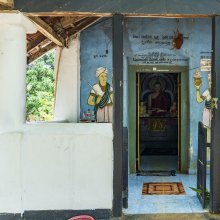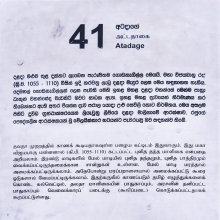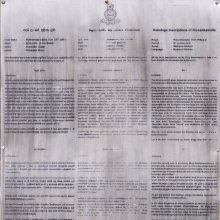Madura, Madurā, Mādurā: 6 definitions
Introduction:
Madura means something in Hinduism, Sanskrit, the history of ancient India, biology. If you want to know the exact meaning, history, etymology or English translation of this term then check out the descriptions on this page. Add your comment or reference to a book if you want to contribute to this summary article.
Images (photo gallery)
In Hinduism
Vaishnavism (Vaishava dharma)
Source: Prabhupada Books: Sri Caitanya CaritamrtaMādurā (मादुरा).—Southern Madurai, presently known as Mādurā, is situated on the banks of the Bhāgāi River. This place of pilgrimage is specifically meant for the devotees of Lord Śiva; therefore it is called Śaiva-kṣetra, that is, the place where Lord Śiva is worshiped. In this area there are mountains and forests. There are also two Śiva temples, one known as Rāmeśvara and the other known as Sundareśvara. There is also a temple to Devī called the Mīnākṣī-devī temple, which displays very great architectural craftsmanship. It was built under the supervision of the kings of the Pāṇḍya Dynasty, and when the Muslims attacked this temple, as well as the temple of Sundareśvara, great damage was done. In the Christian year 1372, a king named Kampanna Udaiyara reigned on the throne of Mādurā. Long ago, Emperor Kulaśekhara ruled this area, and during his reign he established a colony of brāhmaṇas. A well-known king named Anantaguṇa Pāṇḍya is an eleventh-generation descendant of Emperor Kulaśekhara.

Vaishnava (वैष्णव, vaiṣṇava) or vaishnavism (vaiṣṇavism) represents a tradition of Hinduism worshipping Vishnu as the supreme Lord. Similar to the Shaktism and Shaivism traditions, Vaishnavism also developed as an individual movement, famous for its exposition of the dashavatara (‘ten avatars of Vishnu’).
India history and geography
Source: archive.org: Chaitanya’s life and teachings (history)Madura is one of the places visited by Chaitanya during his pilgrimage in Southern India between April 1510 and January 1512.—Madura—on the river Vaigai, the minor basin of which is called Kritima-nadi (the Krita-mala of our text). Its temples are described in the Madura Gazetteer, 267-274.

The history of India traces the identification of countries, villages, towns and other regions of India, as well as mythology, zoology, royal dynasties, rulers, tribes, local festivities and traditions and regional languages. Ancient India enjoyed religious freedom and encourages the path of Dharma, a concept common to Buddhism, Hinduism, and Jainism.
Biology (plants and animals)
Source: Google Books: CRC World Dictionary (Regional names)Madura in India is the name of a plant defined with Erythrina suberosa in various botanical sources. This page contains potential references in Ayurveda, modern medicine, and other folk traditions or local practices It has the synonym Micropteryx sublobata (Roxb.) Walp. (among others).
Example references for further research on medicinal uses or toxicity (see latin names for full list):
· Flora Indica (1832)
· Annals of the Missouri Botanical Garden (1988)
· Revisio Generum Plantarum (1891)
· Linnaea (1851)
· Journal of the Asiatic Society of Bengal.
· Hortus Bengalensis (1814)
If you are looking for specific details regarding Madura, for example health benefits, pregnancy safety, side effects, chemical composition, diet and recipes, extract dosage, have a look at these references.

This sections includes definitions from the five kingdoms of living things: Animals, Plants, Fungi, Protists and Monera. It will include both the official binomial nomenclature (scientific names usually in Latin) as well as regional spellings and variants.
Languages of India and abroad
Sanskrit dictionary
Source: Cologne Digital Sanskrit Dictionaries: Monier-Williams Sanskrit-English Dictionary1) Madura (मदुर):—[from mad] m. a bird, [cf. Lexicographers, esp. such as amarasiṃha, halāyudha, hemacandra, etc.]
2) [v.s. ...] Name of a prince, [Viṣṇu-purāṇa]
[Sanskrit to German]
Sanskrit, also spelled संस्कृतम् (saṃskṛtam), is an ancient language of India commonly seen as the grandmother of the Indo-European language family (even English!). Closely allied with Prakrit and Pali, Sanskrit is more exhaustive in both grammar and terms and has the most extensive collection of literature in the world, greatly surpassing its sister-languages Greek and Latin.
Kannada-English dictionary
Source: Alar: Kannada-English corpusMādura (ಮಾದುರ):—[noun] a heavy battle.
Kannada is a Dravidian language (as opposed to the Indo-European language family) mainly spoken in the southwestern region of India.
See also (Relevant definitions)
Starts with (+4): Madura kanjiram, Maduragam, Madurai, Madurakantha, Maduram, Madurantakam, Maduravasal, Maturacam, Maturacappilu, Maturaccampa, Maturai, Maturai-kula-vanikancattan, Maturai-mateyvam, Maturaiccankam, Maturaikkanci, Maturaiviran, Maturakavi, Maturam, Maturantakanmatai, Maturapashanam.
Ends with: Dharmadura, Langmadura.
Full-text (+123): Minakshi, Sundareshvara, Ati-maduram, Anti-maduram, Adiratneshvaramahatmya, Madura kanjiram, Ketuttam, Shristhalamahatmya, Bilvavanamahatmya, Maduram, Halasyam, Pandyamathura, Rameshvara, Pantukkuti, Marutattupperunturai, Itapakiri, Adicidambaramahatmya, Maturaiccankam, Pantivelalan, Tenmaturai.
Relevant text
Search found 35 books and stories containing Madura, Madurā, Mādurā, Mādura; (plurals include: Maduras, Madurās, Mādurās, Māduras). You can also click to the full overview containing English textual excerpts. Below are direct links for the most relevant articles:
Vastu-shastra (5): Temple Architecture (by D. N. Shukla)
Temples of Madura, the final phase (from 1600 A.D.) < [Chapter 12 - History of Hindu Temples (Prāsādas and Vimānas)]
Pāṇḍya Prākāras and Gopuras < [Chapter 12 - History of Hindu Temples (Prāsādas and Vimānas)]
A History of Indian Philosophy Volume 3 (by Surendranath Dasgupta)
Part 1 - The Chronology of the Āḻvārs < [Chapter XVII - The Āḻvārs]
Part 4 - Rāmānuja Literature < [Chapter XVIII - An Historical and Literary Survey of the Viśiṣṭādvaita School of Thought]
Trichinopoly - the Athens of South India < [November-December, 1929]
South Indian Portraits < [May, 1928]
The Lost Tunes < [April 1939]
Puranic encyclopaedia (by Vettam Mani)
Parama Samhita (English translation) (by Krishnaswami Aiyangar)
The Mahābhārata in the Tamil country in the Sangam age < [Introduction]
Poems included the collection Paripāḍal expound the Pāñcarātra < [Introduction]
The Bhāgavata cult prevalant all over India at the beginning of the Christian era < [Introduction]
Chaitanya's Life and Teachings (by Krishna-das Kaviraj)


